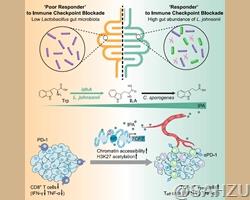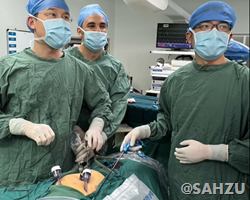

A new study led by SAHZU researchers has identified ways by which some microbes might influence cancer immunotherapy, suggesting a potential microbial-based adjuvant approach to improve the responsiveness of immunotherapy. Their results were published in Cell1 in March 2024.

Italian surgeons Drs. Michele Cricrì and Federico Mongardini and Mexican surgeon Dr. Mitre Reyes have recently completed a three-month clinical training program at SAHZU Colorectal Surgery, as the second group of trainees of International Colorectal Surgery Training Academy of China (ICSTAC).

Dr. Lim Shin Hoei is an anesthesiologist from Penang, Malaysia. She was trained at SAHZU for trans-esophageal echocardiogram (TEE) and cardiothoracic anesthesia for six months. Congratulation to Dr. Lim!

Dr. Sujai Nikhil from India has finished a three month training at SAHZU focusing on interventional cardiology procedures and structural heart problems. Watch what he has gained from this program!

A full scale multi-organizational emergency exercises was conducted by SAHZU, the primary healthcare service provider of the Hangzhou Asian Games, in collaboration with other partners.

A 24 Indian student was diagnosed with right frontal lobe brain abscess and severe brain edema which paralyzed his left side limbs.

A giant cyst was found in a 27-year-old Yemen patient who was finally diagnosed as human echinococcosis, also known as hydatid cyst of the liver.

Meet the new members of SAHZU robot team! Gear up for a speedy recovery with rehabilitation robots at our Rehabilitation Center!

A French patient had an emergency c section at SAHZU Obstetrics. She and her baby boy were very well taken cared of. This is Lea's story at SAHZU.

A critically ill patient was transferred to SAHZU Binjiang Campus by air medical services from Tiantai county, 190km away, for further treatment.

SAHZU doctors are invited by CGTN to talk about COVID precaution tips for the upcoming Spring Travel Rush and protection of the elderly

SAHZU doctors talk on China Global Television Network: COVID-19 variants and what you should know to protect vulnerable people